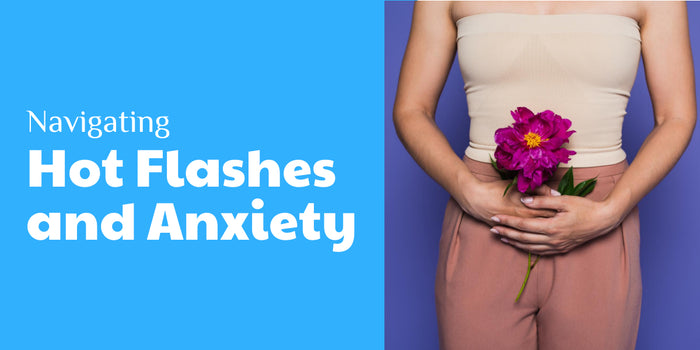Navigating Hot Flashes and Anxiety: Strategies for Relief and Understanding the Connection

Hot flashes, commonly linked with menopause, are not exclusive to this stage. Anyone can experience them due to changes triggered by various factors, including (but not limited to) anxiety and stress.
Understanding the Anxiety-Hot Flash Connection
In moments of panic or stress, a person may experience a sudden sensation of heat, similar to a hot flash. Due to the "fight or flight" response, the body releases stress hormones, increasing blood circulation and contributing to feelings of warmth or flushing. Consequently, unexpected heat may occur when caught off guard by anxiety, stress, or during a panic attack.
The question of which came first, anxiety or hot flashes, has a dynamic answer. The connection is reciprocal, particularly evident during panic attacks where heightened heart and breathing rates intensify both experiences.
"Anxiety can trigger a hot flash. And the opposite is also true — a hot flash can lead to feelings of anxiety. The sudden rush of warmth and other physical symptoms of hot flashes can be really distressing." - Dr. Ibrahim Sozen, MD in Obstetrics and Gynecology at Medina Hospital
Managing Hot Flashes and Anxiety: A Comprehensive Approach
While you may not stop hot flashes in its tracks, you can influence their impact on your life and reduce anxiety to prevent them from occurring. Consider these approaches:
- Focusing on deep breathing exercises
- Hydrating with cool water
- Adjusting clothing layers
- Seeking a quiet, dark environment
- Using cooling products, like Menopod, on your pulse points to interrupt hot flash effects
Pulse Points: Your Body's Temperature Control Centres
Cooling down pulse points, particularly those on the back of the neck and wrists, are effective in regulating body temperature. Menopod leverages these pulse points, offering a convenient and efficient cooling solution wherever and whenever needed.
Your Ally in Hot Flash Management
Menopod can assist you by:
- Alleviating the severity of hot flashes
- Regaining control from hot flash interferences and interruptions
- Providing relief for a quicker return to sleep after a hot flash
- Increasing mindfulness of hot flashes and potential triggers
Embrace Menopod as a versatile companion in your journey to manage hot flashes and anxiety. Regain control and find relief wherever life takes you.

